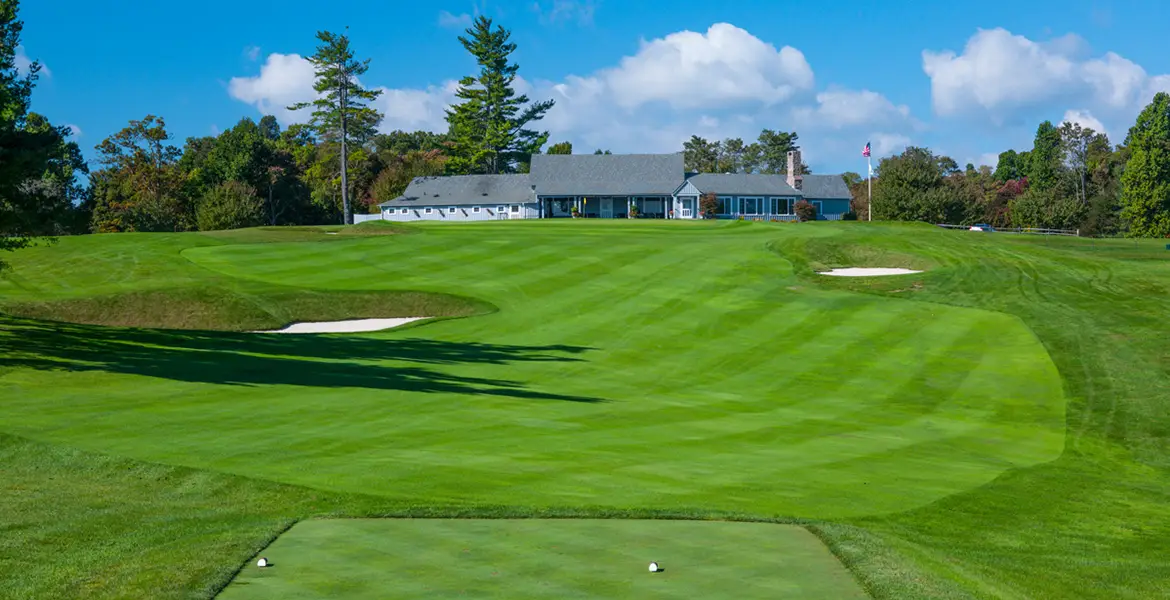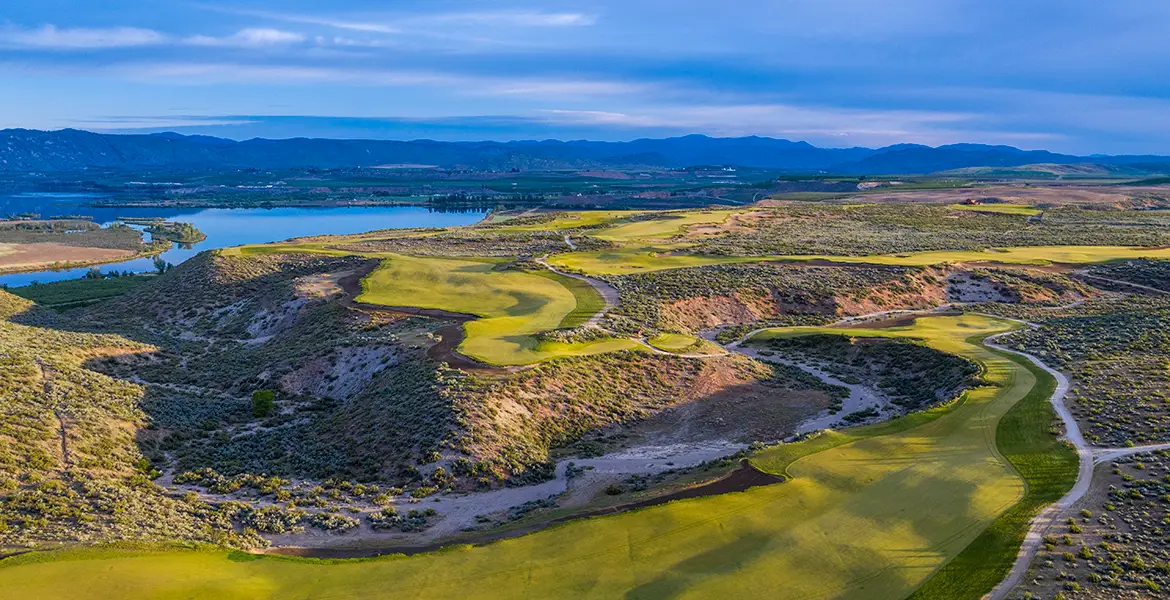Developers go to great lengths to realize the courses of their dreams. Steve Wynn spent $47 million to build the lush oasis of Shadow Creek in the Mojave Desert outside Las Vegas. Dick Youngscap lost himself in the heart of America to found Sand Hills in Nebraska. Mike Keiser had to go to a remote town along the coast of Oregon to establish the resort mecca of Bandon Dunes.
Ed Walker and Art Preston had been to those places. In fact, they had played pretty much all of golf’s great courses, and their favorites were the classic lay-of-the-land designs that have only grown in stature over the decades.
So when the pair wanted to start a club with a similarly timeless layout, they set out to find a natural, secluded setting and rolling topography that would make for a first-class golf retreat. They didn’t think they would find one so close to Walker’s Traverse City home, much less in the classified section of the Traverse City Record-Eagle, where he saw an ad for a 320-acre parcel located 10 miles south of town.
The land was thick with hardwoods and pines surrounding an internal area that had been clear-cut more than 10 years previously, exposing elevation changes—some dramatic, others subtle—made up of ridges, valleys and bowls that had been left behind by glacial deposits.
Despite being just minutes from a major tourist town that is the hub of Northern Michigan, an area known for its large number of golf courses, the site looked as though it were as remote as Sand Hills. (Even now, the unpaved road to the club makes guests wonder if they took a wrong turn until they stumble upon the modest sign, made from barnwood.)
In short, it was the perfect canvas for their vision of the Kingsley Club.
When it came to building a layout on this rugged site, Walker and Preston sought the advice of Fred Muller, the head pro at nearby Crystal Downs Country Club, where Preston is a member. Muller’s recommendation for an architect was an unlikely one—but one that ultimately made sense.
Kingsley was the first solo design for Mike DeVries, who had worked for both Tom Fazio and Tom Doak. But more importantly, DeVries had grown up working at Crystal Downs, so he was intimately familiar with Dr. Alister MacKenzie’s design, a textbook of great golf architecture.

Muller was confident that DeVries could evoke the same kind of Golden Age design and feel at Kingsley. “Ed and Art took a big chance by hiring Mike,” says Muller. “There was no doubt that someone like Tom Doak would have done a great job, but I had great faith in Mike.”
Although skeptical at first, Walker and Preston eventually came to realize the advantages of hiring a young architect. “Mike was easy to work with,” says Walker. “We were part of the design and building process, and our philosophy was part of the finished project.”
Another advantage brought by DeVries was his proximity. “I was on site nearly every day,” he says. “I literally built the course with Dan [Lucas, the course superintendent].”
The familiarity helped DeVries overcome the site’s biggest challenge. Although the terrain allowed for dramatic holes, the real trick was establishing a walkable routing of the 18 best holes. “It was pretty severe land,” says Muller. “I thought it would be very difficult to build a playable course that you could walk, which Mike felt very strongly about. But he did it.”
The course is big and bold, with features in proportion with the property’s epic scale. If many great courses unfurl slowly, a la The Godfather, the 1st hole at Kingsley is like the suspenseful, action-packed first scene of Raiders of the Lost Ark.
On the 1st hole, the two-tier fairway, divided by four fairway bunkers, immediately grabs your attention. From the elevated tee, the hole falls, rises to the landing area and falls again to the lay-up zone before rising again to the green. All the while, the ever-narrowing fairway is infused with natural humps and bumps. The thrills never let up after this exhilarating opener, as Kingsley throws at the golfer a succession of visually arresting, strategic holes that dance atop ridges; play up, down, over and around landforms; and weave between blowout bunkers that meld seamlessly with the native areas that frame the holes.
At Kingsley, throw out exact distances and comfortable club selections. Instead, play by feel and use the contours to feed shots along the fescue turf to the hole.
Some of the literal high points of the 6,945-yard layout are the 7th tee, from which the 8th hole is also visible, making it look like the world’s longest par 5; the 12th tee, which looks down on a 455-yard hole that tumbles down into a natural valley; and the 522-yard 17th, where the fairway has one of the steepest slopes in golf.
From the landforms, DeVries crafted gems like the 171-yard 9th, where a plateau green is surrounded by bunkers and brush. As at the infamous “2 or 20” at Engineers Country Club, missing the tiny target can lead to high numbers.
One of the flattest holes is the 465-yard 15th. But even here, subtle elevation changes dictate strategy. The left side of the fairway is the best angle for reaching a raised green that evokes the putting surfaces of Pinehurst No. 2, but a knoll in the landing area slows down drives, leaving a long approach.

Just as there are no absolutes for playing the holes, the club has few rigid rules. It is a place to have fun instead of having to worry about making an advance tee time. “We want our members and guests to enjoy the spirit of the game,” says Walker. “Just about the only rule we have is ‘Take your hat off inside.’”
This rule is usually not a problem, since members spend most of their time outdoors, whether on the course or at River Camp, a hunting and fishing retreat along a private stretch of the Boardman River, one of Northern Michigan’s best trout-fishing venues. At night, members and guests can retire to the River Camp cottage or the golf cabins located on a hill overlooking the 17th fairway. Featuring Irish-style architecture, the cabins are perfect bases for the club’s national members, who hail from nearly 30 different states.
Visitors can arrange for a meal in their cabin or sample one of the restaurants of Traverse City, just 15 minutes away. The proximity of the city is one of the Kingsley Club’s biggest advantages: It is convenient to get to, yet once on the grounds, members feel like they are truly away from it all.
Northern Michigan has it all: Golden Age gems (Crystal Downs), resorts (Treetops) and public courses (Arcadia Bluffs). As a private golf retreat with an experience and atmosphere matching the quality of the course, Kingsley ranks not just among the best in the state, but with the best in the world.
“Kingsley is a special place and a monument to the game,” says Walker. “I hope that 150 years from now, people are still enjoying the course the way they do now.”






